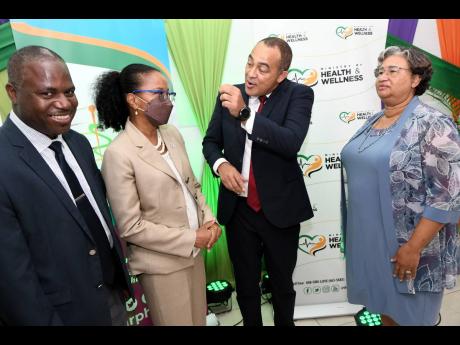Results of salt-intake study to be released next week
In an effort to reduce the number of Jamaicans who suffer annually with non-communicable diseases associated with high salt intake, the key results of a $13-million salt study undertaken by the Ministry of Health and Wellness will be released during the 66th annual Caribbean Public Health Agency (CARPHA) Health Research Conference.
The conference will be held in Jamaica between September 15 and 17 at the AC Marriott Hotel in Kingston. The annual event seeks to drive the difficult conversations that need to be had about all health issues affecting the different countries in the Caribbean region.
Jamaica was selected to host the conference in 2020, but was unable to do so due to the onset of the pandemic and rules outlined under the Disaster Risk Management Act.
The multimillion-dollar salt study was launched last year to assess the level of sodium and potassium consumption among members of the population.
The study was financed through the National Health Fund, an agency of the Ministry of Health and Wellness.
During the press launch of the CARPHA Health Research Conference on Tuesday at the offices of the Ministry of Health and Wellness in New Kingston, Dr Christopher Tufton, minister of health and wellness, reiterated that high sodium consumption and low potassium intake continue to contribute to high blood pressure and the increased risk of heart disease and stroke.
“To say that Jamaica has a significant high blood pressure problem is no understatement, and even more alarming is that we are not alone. High blood pressure in our people is a Caribbean-wide problem; and it is one that threatens to become even more of a challenge, unless we address the risk factors, including our high salt intake,” Tufton said.
“I made this statement almost three years ago at the Regional Stakeholder Meeting on Strategies to Reduce Salt Consumption for the Prevention and Control of NCDs in the Caribbean, and we now have the research that punctuates the truth of this,” he said.
The findings from phase one of the salt study highlighted that 67 per cent, or two out of every three Jamaicans, consume more than the recommended sodium intake (which is about 3.6 grams daily, above the recommended level of two grams daily); 73 per cent of males have higher-than-recommended levels of sodium intake, with the prevalence highest among men age 45 to 54 years; and 60.7 per cent of females have higher-than-recommended levels of sodium intake, with the prevalence greatest among those 35 to 44 years.
THE IMPORTANCE
Tufton stressed the importance of studies such as the salt study for Jamaicans.
“In 2021, over 7,000 Jamaicans had a stroke, over 2,400 died from a stroke, and the rest of them had significant debilitating effects [such as] loss of motion, loss of speech, and so on,” he said.
He added: “We have to put provisions in place to deal with these things as a country. We have an obligation as Government, but we also have to recognise that we have an obligation to explain to people that there are ways to minimise that ultimate end, and indeed, to eliminate it.”
With the majority of adult Jamaicans having diets high in sodium and low in potassium, and a national need to address the burden of hypertension and cardiovascular disease, Tufton warns Jamaicans to control their consumptions.
“If you cut back on the salt and the alcohol, then the hypertension may not come on,” he said.
In addition to the ongoing salt research, which is set for completion next year, the Ministry of Health and Wellness has also done a policy brief on sodium reduction.
The conference will also focus on ‘COVID-19 vaccine hesitancy in the Jamaican populace’; ‘Perspectives of primary care providers and policymakers on the impact of COVID-19 on the health system in Dominica’; and the ‘Psychological effect of COVID-19 on Trinidad’s healthcare workers in primary care during the pandemic’.

